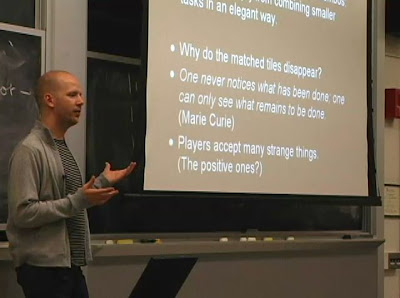
Friday, 7 November 2008
Playing Research

A Game In The Hands Of A Player

Student Presentations
This image is a link to a copy of your PA2
It has been students responsibilities to assign their own groups (of no more than 3) to present their arguments. As the PA2 states this is 40% of your 10 credits, so it is important that you all pose a coherent argument and prepare yourself for the questions and answers that will follow. Don’t forget that if you are arguing for one school of thought that there will probably be people in the audience that are there to argue the other so be prepared.
You can book suggested slots for your presentation here using doodle
I have tried to help you assign groups but it seems to be increasingly difficult week by week to keep track of your groups so… can people please add a list of group members to the comments of this post so I can try and keep track of them and try to help those not in groups to find people to work with.
Here is a link to a video debate on Game Studies hosted at HumLab between Henry Jenkins and Espen Aarseth which might be interesting for you to watch for your research…
http://www2.humlab.umu.se/video/speldebatt.ram
Tuesday, 4 November 2008
Understanding Genre
It is important for us to understand that just calling a game by a tag word such as "RPG" or "shooter" is not enough to analyse a game and understand how it both fits within the matrix or taxonomy of genre and how genre works both as a category and a framework to understand games and their development. Genre is an important aspect of game analysis, many frameworks and methods of categorisation have been established throughout the development of game studies as a defined discipline, some are helpful in understanding the development of games and some are somewhat ludicrous!
Genre frameworks work both as an analytical tool and a marketing tool and it is important to understand what frameworks to use and what purposes they serve.
Costikyan, G. 2005 Game Styles, Innovation, and New Audiences:An Historical ViewProceedings of DiGRA 2005 Conference: Changing Views - Worlds in Play
http://www.darkshire.net/jhkim/rpg/theory/styles.html
Apperley, T. H. Genre and Game Studies: Towards a critical approach to video game genres
http://sag.sagepub.com/cgi/content/abstract/37/1/6
(This will have to accessed from within the university firewalls on a student computer/athens login)






